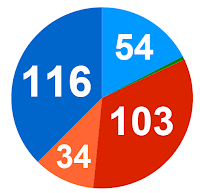 The Conservatives have gained 0.5 points and are now at 31% (oddly enough, The Economist quoted the Conservatives as being at 31% this week. Do they have an inside scoop?) The Liberals have gained more: 1.4 points to 27.7%. The New Democrats dropped 0.9 points to 16.5%.
The Conservatives have gained 0.5 points and are now at 31% (oddly enough, The Economist quoted the Conservatives as being at 31% this week. Do they have an inside scoop?) The Liberals have gained more: 1.4 points to 27.7%. The New Democrats dropped 0.9 points to 16.5%.The Greens are at 13%, up 0.7 points. The Bloc Québécois is down 1.2 points to 9.3%, while "Other" is at 2.5%.
The Liberals lead in Ontario with 35.3%, unchanged from last week. The Conservatives are at 32.3%, up one, while the NDP is at 18.2%, up two. The Liberals lead in Toronto with 36.6%. The Tories are in front in Ottawa with 38.1%.
The Bloc is down three points to 38.9% in Quebec, while the Liberals are down one to a woeful 18.8%. The Conservatives are steady at 14.6%, as are the NDP at 13.1%. The Bloc has 39.8% in Montreal.
The Liberals, gaining ten points, lead all of a sudden in British Columbia, with 29.1%. The Conservatives are down three to 27.1% and the NDP is down eight to 22.3%. The Greens are up two to 19.2%. The Liberals lead in Vancouver with 35.8%.
The Conservatives jump nine points in Atlantic Canada and lead with 37.8%. They also lead in Alberta with 54.9% and the Prairies with 45.1%. The Liberals are up five in Alberta.
 The Conservatives win 63 seats in the West, 36 in Ontario, 5 in Quebec, and 12 in Atlantic Canada for a total of 116 - a loss of 28 MPs.
The Conservatives win 63 seats in the West, 36 in Ontario, 5 in Quebec, and 12 in Atlantic Canada for a total of 116 - a loss of 28 MPs.The Liberals would win 20 in the West and North, 52 in Ontario, 14 in Quebec, and 17 in Atlantic Canada for a total of 103 - a gain of 26.
The Bloc wins 54 seats in Quebec, a gain of seven.
The NDP wins 11 seats in the West and North, 18 in Ontario, 2 in Quebec, and 3 in Atlantic Canada for a total of 34, a loss of two.
The Greens win one seat in British Columbia.
A few other things: the NDP is the favourite "second choice", with 21%. The Liberals are next with 16%, but of course "no second choice" leads with 37%.
An interesting question was whether Canadians would prefer a Conservative government under Stephen Harper or a coalition government under Michael Ignatieff. With these seat totals, it is a good question to ask.
The country is split, with 39% preferring either the Conservatives or a coalition. Interestingly, this gives the Tories a bump of eight points, but a loss of five points for the combined Liberals and NDP.
Support for a Conservative government greatly outnumbers the party's support in British Columbia (40%) and Alberta (66%). In Ontario, it bumps up the party's support to 39%, in Quebec to 23%. In Atlantic Canada, it only gives them an extra point.
Support for a coalition only outnumbers the combined parties' support in Quebec, where 45% would prefer a coalition government (the two parties have 32% support in the province). Coalition support outnumbers Conservative support in Ontario (41%) and Quebec only. It is very close in British Columbia (38%) and Atlantic Canada (38%).
Interestingly, while 66% of Liberals would support the coalition over a Conservative government (18%), only 57% of NDP supporters would be happier with the coalition, versus 19% with the Conservatives.
Those are dangerous numbers, since it appears 1 in 5 Liberal or NDP supporters would consider jumping to the Tories if a coalition was explicitly pursued by the Liberals and NDP.
Overall, this poll has a few odd results (especially at the two extreme ends of the country), but is generally bad news for the Tories, who are behind in the three battleground provinces. It isn't great for the Liberals, as they are doing badly in Quebec and are not very strong in Ontario and Atlantic Canada.
However, the combined seat totals of the Liberals and NDP puts them at 137 - pretty much the same as today's Conservative minority. Perhaps that is the most important number.
Bonne St-Jean-Baptiste!

